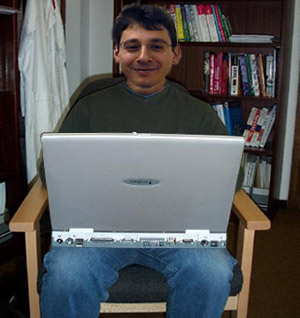 |
|
Call Me Maybe (video)
|
|
Monday, August 4 12:01 AM EDT |
Wide-load Laptops Target
By
Brian Briggs
|
||
|
Lardo, KS - Wide-load laptop computers are the fastest growing market segment in the computer industry. These computers try to match the growing width of Americans' laps with comparably sized computers.
Other manufacturers quickly followed with their own versions. Earlier this year, Dell introduced their Longitude line of laptops. These notebooks range from forty-five to seventy-two inches wide. "I love the new wider laptops," said 420 pound Daryl Yutzer. "My old laptop disappeared on my thighs and made me look pudgy. My new Compaq Fatro, however, actually has a slimming effect. More girls approach me in the computer lab." Other users of wide-load laptops have found even more benefits. "My company pays to upgrade me to first class when I fly so I can use my new laptop," said Kyle Kregan whose laptop measures thirty-six inches across. "It's one of those unexpected perks." Steve Jobs, the CEO of Apple, announced the WideBook 98" at the recent AppleFest 2003. The enormous computer trades Apple's normal thin and light design for a profile more akin to its users. Of course, the WideBook contains typical Apple innovation like a built-in hand truck for transporting the ninety pound computer.
Laptop manufacturers have switched most production to the wide-load segment as these oversized computers boast even fatter profit margins than their normal laptops. "It's a cycle that we think will continue," said Thomas Skoburn from the Portable Computer Manufacturing Group. "As people spend more time on computers they will grow even larger from inactivity and thus will need a bigger laptop which will make them want to use the computer more. That's what I call a cash cow." |


 Sony
was the first company to recognize this growing market and introduced
the Wideo last year. Harold Schneider, who heads Sony's notebook
computer division, explained, "We could see that Americans were
getting wider, but notebook manufacturers still concentrated on keeping
things compact. I told my engineers to 'let themselves go,' and they
developed the Wideo which measures forty-eight inches across."
Sony
was the first company to recognize this growing market and introduced
the Wideo last year. Harold Schneider, who heads Sony's notebook
computer division, explained, "We could see that Americans were
getting wider, but notebook manufacturers still concentrated on keeping
things compact. I told my engineers to 'let themselves go,' and they
developed the Wideo which measures forty-eight inches across."